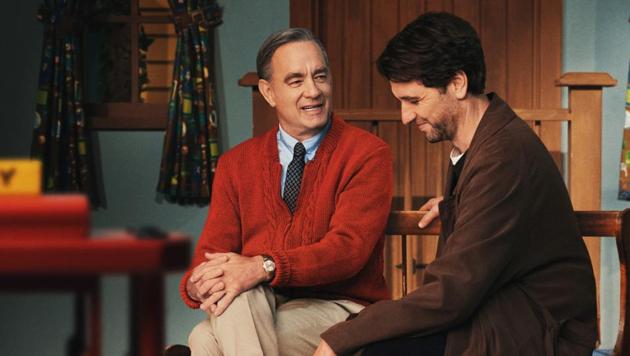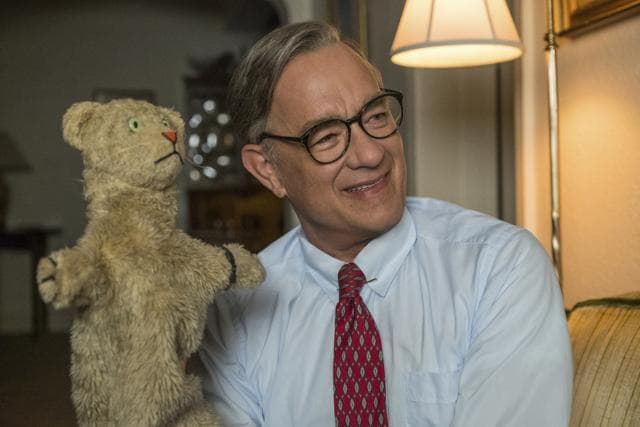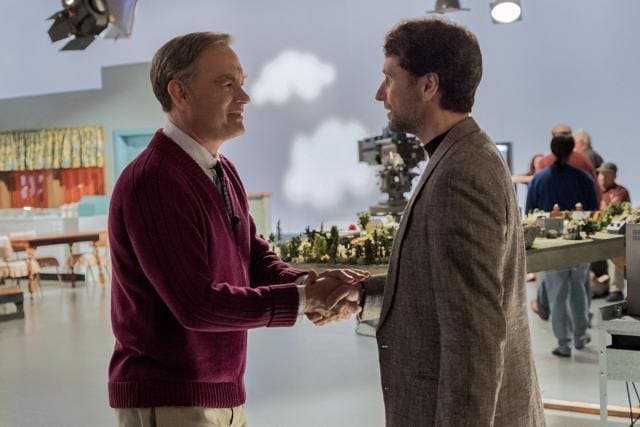A Beautiful Day in the Neighborhood movie review: Tom Hanks deserves an Oscar (and a sainthood)
A Beautiful Day in the Neighborhood movie review: Tom Hanks’ film is too good for this world. It’s old-fashioned in its craft, earnest in its tone, and utterly positive in its outlook. We can, and we must, learn from it.
A Beautiful Day in the Neighborhood
Director - Marielle Heller
Cast - Tom Hanks, Matthew Rhys, Chris Cooper

At a time when humanity seems to be under the spell of fraudsters masquerading as elected officials and false idols just waiting to be toppled, A Beautiful Day in the Neighborhood presents the story of a true saint. But Fred Rogers would disapprove of that description. It suggests a certain unattainability, which goes against his philosophy. The children’s television host wanted to give his viewers — millions and millions across several decades — ideals they could strive towards.
Having next to no knowledge about Mr Rogers, shamefully so, he comes across as quite the anomaly in the film — not only by our cynical standards, but by any yardstick. He would routinely make his crew wait, sometimes as long as two hours, while he chit-chatted with guests and insisted on taking their pictures to show his wife later. He would spend just as long with his legions of fans on the streets, shaking hands, offering words of wisdom, and listening to their stories. While taping an episode in which he attempts to pitch a tent, Mr Rogers tries for several minutes before realising he can’t manage it on his own. He insists on keeping the footage as is, and refuses his crew’s suggestion to try again, or rig the tent in advance. His sees his failure as a valuable lesson for his audience: “When adults make plans, sometimes they don’t turn out the way they’d hoped.”
Watch the A Beautiful Day in the Neighbourhood trailer here
Indeed, it sounds like the sort of behaviour you’d expect out of Tom Hanks, who is perhaps the only man on the planet who could have played Mr Rogers. Few actors have the innate likability that Hanks has so effortlessly projected, like Mr Rogers, for decades on screen. My favourite recent Tom Hanks anecdote involves a stray iPhone, forgotten in the same room as him. When the owner, after having recovered the phone, was going through their photos the next day, they discovered a rather delightful surprise: a goofy selfie that could only have been taken by one person, ‘Hanx’ himself.
He gives Mr Rogers’ speech an almost jazzy cadence. His mere presence seems to generate awe. If he has any flaws — and he must; he is human, after all — they aren’t revealed to us. Characters such as Mr Rogers don’t make for thrilling protagonists. Just ask Superman. But director Marielle Heller, who made the terrific Can You Ever Forgive Me? last year, makes the wise decision to make Mr Rogers a supporting character in the story; to not have him front and centre, but allow him instead to be a catalyst for change in the life of another man.

And that man is our surrogate in the film. He is the representative of the outside world, sent to explore the wonders of Mr Rogers’ alien universe, all the while battling daddy issues and other assorted demons. Played by Matthew Rhys, Lloyd Vogel is a fictionalised version of the journalist Tom Junod, who in the late 90s was assigned to write a profile of Mr Rogers for Esquire. Like any narcissistic writer, his immediate reaction was to take offence. Here he was, a fresh recipient of the prestigious National Magazine Award, being told to write about a children’s TV host and not Gorbachev.
There is, of course, a reason why A Beautiful Day in the Neighbourhood chooses to address its themes of scepticism and optimism by balancing the inherent decency of Mr Rogers, whom Lloyd in an early scene describes as ‘the nicest man’ he has ever met, with a profession that seems to be the manifestation of modern cynicism. There is perhaps no other group of people that regards death with the sort of unfeeling apathy as journalists hungry for a byline. And like the ordained minister that he was (although Heller’s secular film chooses to largely ignore his religious side), Mr Rogers goes on a mission to convert Lloyd, not theologically, but as a human being.

We’ve seen this dynamic — of a journalist undergoing a life-changing transformation while profiling an enigmatic subject — being explored in several recent films. In Anton Corbijn’s Life, a young photographer shadows the actor James Dean across the US, and in James Ponsoldt’s The End of the Tour, a profiler not unlike Lloyd finds himself trapped in the company of the charismatic writer David Foster Wallace.
But more than these films, A Beautiful Day in the Neighbourhood reminded me of the recent Disney movie, Christopher Robin, about a weathered man reconnecting with the whimsy of his youth; and Joker, another film that addresses themes of empathy and compassion, but in quite the opposite manner.
Much like Mr Rogers, about whose attempts to influence America I have since researched, mostly through the wonderful documentary Won’t You Be My Neighbour?, A Beautiful Day in the Neighbourhood might be too good for this world. It’s old-fashioned in its craft, earnest in its tone, and utterly positive in its outlook. We can, and we must, learn from it.
Follow @htshowbiz for more
The author tweets @RohanNaahar






